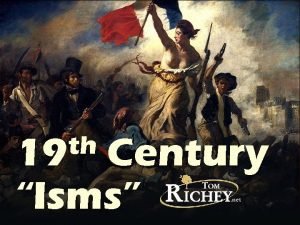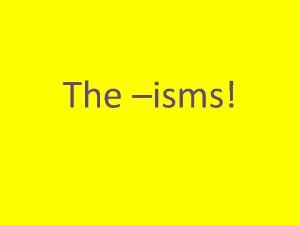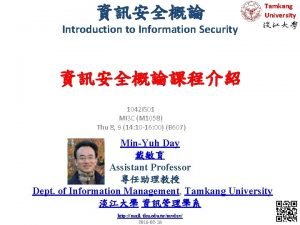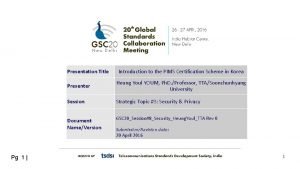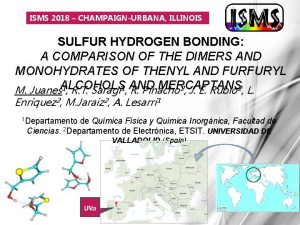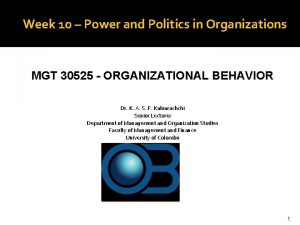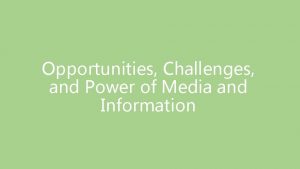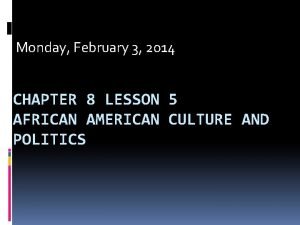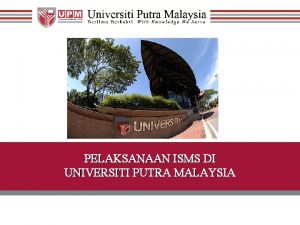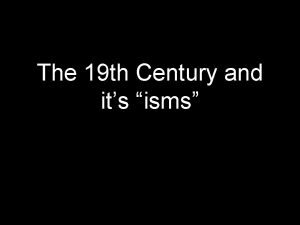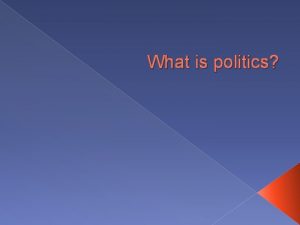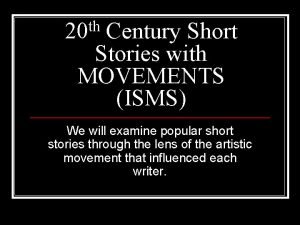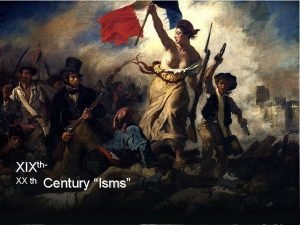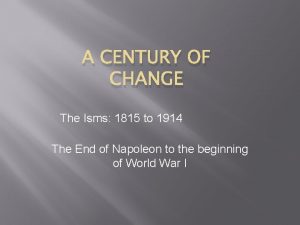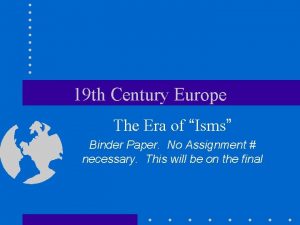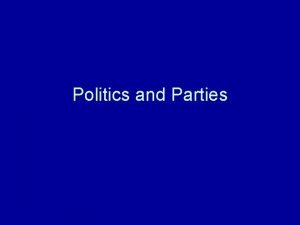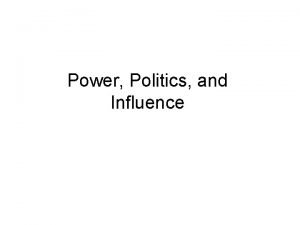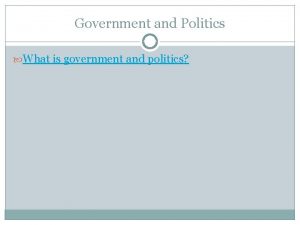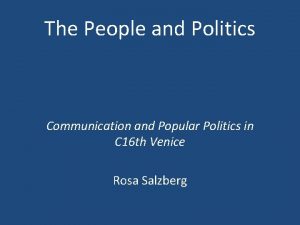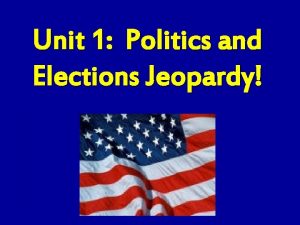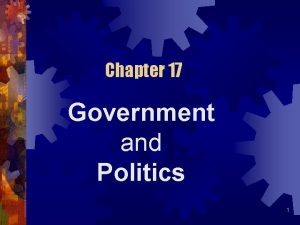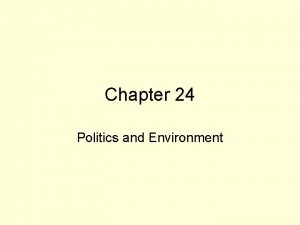Isms and the 20 th century Politics is



















- Slides: 19

Isms and the 20 th century “Politics is a pendulum whose swings between anarchy and tyranny are fueled by perpetually rejuvenated illusions. ” Albert Einstein Anarchy chaos Tyranny being ruled by a dictator usually not good

Socialism • True socialists advocate a completely classless society, where the government controls all means of production and distribution of goods. Socialists believe this control is necessary to eliminate competition among the people and put everyone on a level playing field. Socialism is also characterized by the absence of private property. The idea is that if everyone works, everyone will reap the same benefits and prosper equally. Therefore, everyone receives equal earnings, medical care and other necessities. • Socialism is difficult to define because it has so many incarnations. One of the things socialists agree on is that capitalism causes oppression of the lower class. Socialists believe that due to the competitive nature of capitalism, the wealthy minority maintains control of industry, effectively driving down wages and opportunity for the working class. The main goal of socialism is to dispel class distinctions by turning over control of industry to the state. This results in a harmonious society, free of oppression and financial instability.

Socialism different types • Guild socialism: Based in early 19 th century England, workers' guilds (similar to unions) were responsible for control and management of goods. • Utopian socialism: Advocates social ownership of industry and a voluntary, nonviolent surrender of property to the state. Implemented in communities like Robert Owens' New Lanark. • State socialism: State socialism allows major industries to be publicly owned and operated. • Christian socialism: Developed in England in 1948, this branch was born from the conflict between competitive industry and Christian principles. Christian socialist societies are characteristically led by religious leaders, rather than socialist groups. .

Socialism types continued • Anarchism: Opposes domination by the family, state, religious leaders and the wealthy. Anarchism is completely opposed to any form of repression and has been associated with some radical events, including assassinations in Italy, France and Greece. U. S. President William Mc. Kinley was assassinated by an anarchist • Market Socialism: Often referred to as a compromise between socialism and capitalism. In this type of society, the government still owns many of the resources, but market forces determine production and demand. Government workers are also enticed with incentives to increase efficiency. • Agrarianism: Form of socialism that features the equitable redistribution of land among the peasants and self government similar to that in communal living. Agrarian ideals were popular in the rural United States well into the 1900 s, although increasing government control deterred their growth.

Basic History of Socialism • Thomas More coined the term "utopia" in 1515 in his treatise titled "Utopia, " but utopian imaginings began long before his. Plato described a similar environment when he wrote the philosophical work "Republic" in 360 B. C. In 1627, Francis Bacon's "New Atlantis" advocated a more scientific approach, rooted in the scientific method. Bacon envisioned a research institute like society where inhabitants studied science in an effort to create a harmonious environment through their accumulation of knowledge. In addition to these landmark works, more than 40 utopian themed novels were published from 1700 to 1850, cementing its status as a very popular ideal [source: Foner]. Because many social injustices such as slavery and oppression were running rampant, theme was quite popular among embittered and dispirited populations.

Communism deprives no man of the ability to appropriate the fruits of his labor. The only thing it deprives him of is the ability to enslave others by means of such appropriations. KARL MARX, The Communist Manifesto • The political theory of socialism, which gave rise to communism, had been around for hundreds of years by the time a German philosopher named Karl Marx put pen to paper. Marx, also known as the father of communism, spent most of his life in exile in Great Britain and France. He wrote the Communist Manifesto in 1848, which later served as the inspiration for the formation of the Communist Party. Communism is also known as "Marxism. " • Marx believed that a truly utopian society must be classless and stateless. (It should be noted that Marx died well before any of his theories were put to the test. ) Marx's main idea was simple: Free the lower class from poverty and give the poor a fighting chance. How he believed it should be accomplished, however, was another story. In order to liberate the lower class, Marx believed that the government would have to control all means of production so that no one could outdo anyone else by making more money. Unfortunately, that proves to this day to be more difficult than he might have realized.

3 phases to achieving the utopian ideal • • • Phase 1: A revolution must take place in order to overthrow the existing government. Marx emphasized the need for total destruction of the existing system in order to move on to Phase 2: A dictator or elite leader (or leaders) must gain absolute control over the proletariat. During this phase, the new government exerts absolute control over the common citizen's personal choices including his or her education, religion, employment and even marriage. Collectivization of property and wealth must also take place. Phase 3: Achievement of utopia. This phase has never been attained because it requires that all non communists be destroyed in order for the Communist Party to achieve supreme equality. In a Marxist utopia, everyone would happily share property and wealth, free from the restrictions that class based systems require. The government would control all means of production so that the one-class system would remain constant, with no possibility of any middle class citizens rising back to the top.

10 Essential aspects of Communism • • • Central banking system Government controlled education Government controlled labor Government ownership of transportation and communication vehicles Government ownership of agricultural means and factories Total abolition of private property Property rights confiscation Heavy income tax on everyone Elimination of rights of inheritance Regional planning

1. COMMUNISM help from multiple websites • Brief History in Russia was a czarist nation when the • • philosophies of communism started to take hold. For centuries, Russia was ruled by a monarchy that wielded absolute power over the people: the Romanov Dynasty. Czar Nicholas II and his wife resisted the shift toward democracy that much of the world was making. The members of Russia's lower classes had long suffered in poverty. These two factors, combined with the huge losses suffered during World War I, made the czar very unpopular. In addition, he and his family were living in luxury while their subjects struggled for basic necessities [source: First World War]. By February 1917, the war had taken a massive toll on Russia -- both in the loss of human lives and in the form of a severe nationwide famine. When a metalworking plant closed, resulting in the loss of many jobs, strikes and protests broke out. Russia was in a state of chaos. The army was sent in to control the situation, but many of the soldiers sympathized with the workers and defected, choosing to support them instead. As many as 150, 000 soldiers joined the massive protest -- which is now known as the February Revolution. The situation went downhill so fast that the military lost control completely. With virtually no support from the military, Czar Nicholas II was forced to abdicate his throne. The Russian Provisional Government was set up to take his place, effectively ending the Romanov Dynasty. In July 1918, the Bolsheviks assassinated the czar and his family.

Communism common terms employed in communism • • • Socialism: A system that advocates the state's ownership of land, industry and capital. Communism is a branch of socialism. Capitalism: Economic system in which individuals or corporations own land means of production Bourgeois: The middle class/upper class, or the owners of land means of production Proletariat: The working class Kulak: Wealthy peasants Bolsheviks/Bolshevists: Russian word for "majority. " Also, the political party that spawned the Bolshevik Revolution, effectively introducing communism in Russia Mensheviks: By definition, "minority, " although this Russian party had many more supporters than the Bolsheviks when Lenin returned to Russia in 1917. Reds: Communist/Bolshevik supporters. Also, "red" is a derogatory term to describe communists. Whites: Those opposed to the Bolshevik regime's takeover Gulags: Russian slave labor camps Utopia: A perfect place, in reference to social, moral and political issues

Communism History after WWI • • • When Czar Nicholas was dethroned in 1917, Vladimir Lenin was in exile in Switzerland for playing a part in some previous anti czar plots. When he heard of the uprising, Lenin cut a deal with Germany. If the Germans could transport him home, he would get Russia to back out of World War I. The Germans agreed and snuck him back in to Petrograd through a railway car. The Communist Party was about to gather more steam. Leon Trotsky, a Russian revolutionary who had escaped from prison and fled to America, returned to Russia to serve as Lenin's right hand man. Trotsky is largely credited for engineering the Bolshevik Revolution. Because the Russian Provisional Government supported the war effort, it didn't last very long. Many people shifted loyalties to the Bolsheviks, Lenin's pro Communism party, which opposed the war. When the revolution struck, the Bolsheviks used this momentum to overthrow the Provisional Government. Lenin's Red Guard took control of the Winter Palace (former home of the czar and later the Provisional Government's headquarters), effectively overturning the Provisional Government. And true to his word, Lenin pulled Russia out of the war

Communism history continued • • But some Russians still weren't too sure about the Bolsheviks. Lenin endeavored to gain support by broadcasting slogans such as "Bread, Land, Peace and All Power to the Soviets. " To people suffering from famine, this promise hit the spot. Yet in elections for the Russian Constituent Assembly in late November 1917, only a quarter of voters cast ballots for the Bolsheviks. Lenin overturned the results and sent armed guards to prevent meetings of the democratic assembly. This made it virtually impossible for the Russian people to voice their concerns in a democratic way. The years from 1917 to 1920 became known as "war communism" due to the methods the Bolsheviks used to push their political agenda. In 1918, the party was renamed the Russian Communist Party. Lenin and his communist cohorts endeavored to put Marx's tenets of belief into practice. This marked the beginning of the Russian Civil War, which lasted from 1918 until 1922. When the war ended, the Soviet Union formed also known as the U. S. S. R. , the Soviet Union included Russia and 15 bordering states.

Communism History continued • • Lenin was aware that the upper class wouldn't willingly give up land or wealth, so he created the New Economic Policy (NEP) to legislate redistributing land -- taking it from the nobility and giving it to the poor. Upholding the necessary phases that Marx outlined, Lenin initiated the Red Terror, a threatening fear campaign led by the Bolsheviks. His goal was mass murder, which he accomplished through three main methods. Man-made famine was Lenin's most successful tool. He knew that if he could break the peasantry, he'd have full control. Lenin engineered famines by requiring peasants to sell their crops to him at virtually no profit, using the rationale that he needed the crops to support his army. The peasantry was so indignant that they reduced crop production drastically, leading to a full scale civil war. The exact numbers vary, but tens of millions of people starved and millions died. Lenin also instituted slave labor camps. Anyone who disagreed with Lenin's rule was sent to work at one of these camps, where millions more suffered and died [source: Wolcott]. And, he executed his detractors to silence their voices. During the Red Terror, hundreds of thousands of detractors were put to death. Victims included members of the bourgeoisie, White Army prisoners of war, socialists, Czarist sympathizers and innocent civilians [source: Wolcott].

Communism History to 1929 • • • When Lenin died in 1924, Joseph Stalin came into power and managed to target one of the only groups that Lenin never did: fellow communists. In Stalin's eyes, anyone who didn't back him 100 percent was an enemy. He purged many members of the Communist Party for a range of crimes, including treason, political deviations and espionage. When all was said and done, Stalin ordered the deaths of nearly all of his Bolshevik comrades, including Trotsky. Stalin took Lenin's methods of terrorizing the people a few steps further. Whereas Lenin let people starve to death, Stalin used famine to further his political goals. He took back the land that Lenin had turned over to the peasants through the New Economic Policy and forced collectivization of agriculture in the U. S. S. R. The peasants resisted and crop production diminished even more than during Lenin's reign. Widespread famine continue to kill millions of people, and during the Great Terror of 1936 1939, Stalin ordered the executions of millions more. Stalin wanted to take communism worldwide. He knew that in order to do so, he would have to industrialize Russia. Stalin built factories in strategic places so they would not be vulnerable to outside enemies. He built so many so quickly that Russia soon surpassed many other major countries in industry. His legacy continued well after his death

Fascism

Fascism • The word "fascists" (or fascisti) as used in the 1930 s by Benito Mussolini, the leader of the first Fascist movement and the Fascist dictator of Italy before and during World War II, most likely comes from the Italian word fascis and the Latin word fasces. Fascis means something along the lines of "bundle" or "unit. " Fasces was a symbol of authority in ancient Rome, an axe surrounded by rods. These two roots offer a good glimpse into the basic tenets of fascism: unity and power. • http: //www. fordham. edu/halsall/mod/mussolini fascism. html

Essential aspects of Fascism • • Absolute power of the State: The Fascist state is a glorious, living entity that is more important than any individual. All individuals are part of the State, but the State is greater than the sum of its parts. All individuals must set aside their own needs and supplicate themselves to the needs of the State. There is no law or other power that can limit the authority of the State. Survival of the fittest: A Fascist state is only as glorious and powerful as its ability to wage wars and win them. Peace is viewed as weakness, aggression as strength. Strength is the ultimate good and ensures the survival of the State. Strict social order: Social classes are strictly maintained in order to avoid "mob rule" or any hint of chaos. Chaos is a threat to the State. The State's absolute power and greatness depends on the maintenance of a class system in which every individual has a specific place, and that place cannot be altered. Authoritarian leadership: To maintain the power and greatness of the State requires a single, charismatic leader with absolute authority. This all powerful, heroic leader maintains the unity and unquestioning submission required by the Fascist state. The authoritarian leader is often viewed as a symbol of the State.

Anarchism • Ever reviled, accursed, ne'er understood, Thou art the grisly terror of our age. "Wreck of all order, " cry the multitude, "Art thou, and war and murder's endless rage. " O, let them cry. To them that ne'er have striven The truth that lies behind a word to find, To them the word's right meaning was not given. They shall continue blind among the blind. But thou, O word, so clear, so strong, so pure, Thou sayest all which I for goal have taken. I give thee to the future! Thine secure When each at least unto himself shall waken. Comes it in sunshine? In the tempest's thrill? I cannot tell--but it the earth shall see! I am an Anarchist! Wherefore I will Not rule, and also ruled I will not be • JOHN HENRY MACKAY.

Anarchism • The philosophy of a new social order based on liberty unrestricted by man made law; theory that all forms of government rest on violence, and are therefore wrong and harmful, as well as unnecessary.
 Conservatism buzzwords
Conservatism buzzwords Iso 27001 implementation project plan
Iso 27001 implementation project plan Isms in literature
Isms in literature The 5 isms
The 5 isms Isms 1042
Isms 1042 Isms keller
Isms keller Hvad er isms
Hvad er isms Isms
Isms Isms org
Isms org Iso 27001 roadmap
Iso 27001 roadmap Pims
Pims Alex bevan
Alex bevan Isms2017
Isms2017 Isms
Isms Isms guiding principles
Isms guiding principles Isms metrics
Isms metrics Power and politics in organizations
Power and politics in organizations Challenges brought by media and information.
Challenges brought by media and information. Lesson 5 african american culture and politics
Lesson 5 african american culture and politics Bureaucracy and politics in india
Bureaucracy and politics in india
